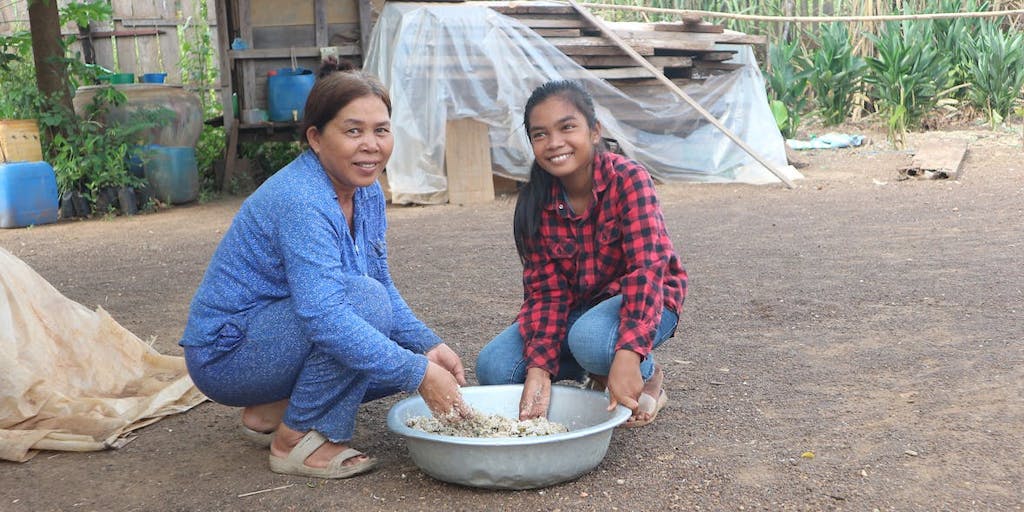A gift of chickens brought hope to Sarum, who lives in the Ou Takok community of Cambodia. Poultry seemed an unlikely answer for the struggling grandmother, who believed she was in a hopeless situation.
She and her family had little to eat, and she could find no way to contribute to the support of her household. Her 57-year-old husband is a soldier who she says rarely helps with household needs, making life more difficult for her and the rest of the family.
A Family’s Struggle
Her son, Bory, also found family life difficult. He divorced his first wife shortly after their daughter, Samnang, was born. Later, he married his second wife, and his second daughter, Otsar, was born.
Tragically, he died shortly after that, although still young. His two daughters – Sarum’s 12- and 7-year-old granddaughters – became Sarum’s responsibility when their mothers were forced to find work far away. Their only solution was to make the difficult trip to work long hours in the garment factories of Phnom Penh.
No Solutions in Sight
This arrangement was far from ideal, and Sarum couldn’t see a path to making things better. She couldn’t travel to find work, and she didn’t have farming experience or the knowledge to create a garden to grow vegetables for healthy meals or the skills to care for livestock – let alone money to buy these things.
And, because the family had recently moved to Ou Takok, they didn’t have a suitable home, so they were also suffering in poor living conditions. All of these challenges made it difficult for the young girls to attend school.
Daily Life Was Dangerous
There were also problems throughout their community, which suffered from disunity and many dangers. While a very few people practiced farming, most attempted to hunt for food in the dense forest surrounding their homes. This put them at constant risk of fatal snake bites. Walking into the forest also presented the danger of stepping on unexploded ordnance – live mines left behind in past wars.
Families in the community didn’t have use of a latrine, and this created a constant health hazard for Sarum’s family.
“But lack of daily nutrition was the biggest challenge,” explains Sarum. “We could not find something to eat regularly. This made me feel fearful and exhausted.”

Hope Arrives
Food for the Hungry (FH) began working in the community in late 2015, and Sarum joined the FH project in 2017.
“My neighbors encouraged me to volunteer, and that is how I got started. Soon, other neighbors voted for me to be a Community Health Volunteer,” she says. At the same time, her two grandchildren became active in programs that funds from child sponsors made possible.
Sarum took part in “activity plans” of her own choosing. First, she learned effective hygiene techniques, including how to wash hands correctly and often.
A Gift of Chickens, a Flock of Hope
“But I received much more training from FH staff,” says Sarum. “They taught us techniques for raising chickens, including keeping them safe and healthy. They even taught us how to make our own natural feed for them. Then I received a gift of chickens that generous supporters had purchased through the FH gift catalog.
“FH taught us to plant and care for a home garden to provide balanced nutrition for our meals. They also taught us how to sell the surplus.”
And, she says, as she continued to learn and her flock of chickens thrived, their eggs went beyond just a food source for the family. She soon had enough to sell eggs to others, along with the produce from her garden, providing more income to buy the things her family needed. FH staff even taught her how to use her chickens’ manure to fertilize her garden for improved results.
Learning Better Practices
Sarum says her life is much better today.
“FH helped to solve so many of my family’s challenges and taught me so much. Now I grow healthy crops by using the right techniques without chemicals. My chicken coops are made with the proper techniques so the flock doesn’t get loose and wander off. They also taught me to use chicken manure to make water compost. This means I always have enough water for my garden.
“They made it possible for us to have a latrine and also taught us to use it properly for good hygiene. And they guided me through a poultry-disease outbreak, so I didn’t lose my chickens.”
A Better Way of Life
With plenty of nutritious food to eat and a good income, Sarum says she is able to support the education of both of her granddaughters. “Now their mothers no longer have to travel to work in the garment factories in Phnom Penh,” she says proudly.
Sarum went on to help others in the community, as well. “I provided one breeder hen each to three poor families, which they in turn bred together to make stronger blood lines. Soon, everyone had healthy chickens!”
And Hope for a Better Future
She also has dreams for a brighter future.
“I hope to have a better house, a prosperous family, and to help my granddaughters finish their studies and earn bachelor’s degrees. I have committed to be a good role model for my neighbors and to share what I have learned with them without any hesitation, because I want to see my community grow together.”
Would you like to make a difference like this for a struggling family? Go to the FH catalog to give a gift of chickens today!
Continue reading:
Chickens, Pigs, and Pencils: How Simple Things Create Big Opportunities


